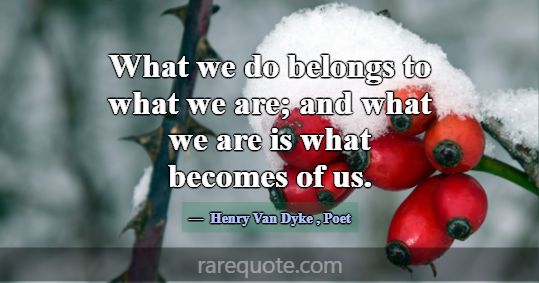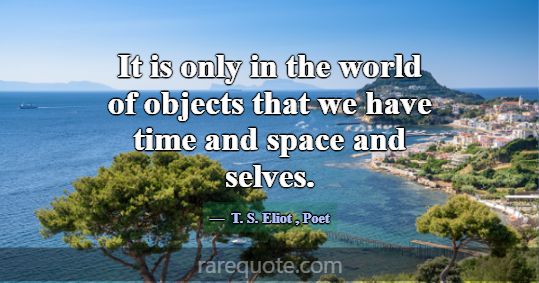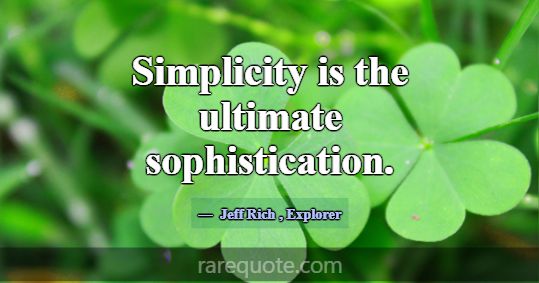Brainy Quotes - Page 4
This quote draws a comparison between talent and genius. It suggests that while talent may be a remarkable ability or skill, genius represents a greater intensity, passion, and transformative power that can ignite significant changes or innovations.
This quote emphasizes the connection between one's actions and their personal identity or character. It suggests that our actions define who we are, and the consequences of those actions shape our future and determine our destiny.

This quote emphasizes the responsibility of recognizing and utilizing one's evident talents and capabilities. It suggests that denying or ignoring one's innate abilities is equivalent to evading the obligations that come with those gifts.
This quote suggests that those who take bold and daring actions are more likely to attract good fortune or positive outcomes. It implies that being courageous and willing to take risks increases the chances of success.

This quote draws attention to the importance of self-realization and self-fulfillment in human life. It suggests that a deficiency in understanding oneself, finding purpose, or achieving personal growth can have detrimental effects on one's well-being, comparable to physical deprivation.
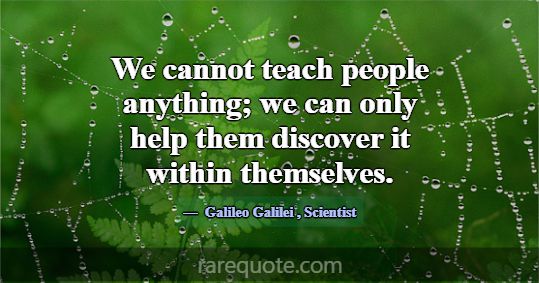
This quote emphasizes the role of facilitation and guidance in the learning process. It suggests that true learning and understanding occur when individuals are guided to discover knowledge, insights, or truths from within themselves, rather than passively receiving information.
This quote reflects on the role of external reality in shaping our perception of time, space, and individual identity. It implies that our understanding of these concepts is contingent upon our interactions with the physical world.
This quote highlights the role of perspective and interpretation in influencing human emotions and reactions. It suggests that it is not the objective nature of events or circumstances that disturb individuals, but rather their subjective perception and interpretation of those events.

This quote advises treating others with kindness and respect, regardless of one's current position or status. It implies that people may encounter the same individuals they interacted with during their ascent when they face setbacks or decline. It reflects the importance of cultivating positive relationships and considering long-term consequences of one's actions.
This quote emphasizes that every individual possesses skills or talents, but what distinguishes people is how they utilize and apply their abilities. It suggests that the outcome or impact is determined by the actions and choices made with those talents.
This quote expresses the idea that simplicity, characterized by elegance and minimalism, is the pinnacle of refinement and sophistication. It suggests that complexity may be surpassed by the beauty and sophistication found in simplicity.
This quote highlights the importance of forward-thinking and embracing change for progress and growth. It suggests that true advancement and improvement come not from solely improving existing conditions but from actively pursuing and embracing future possibilities and innovations.
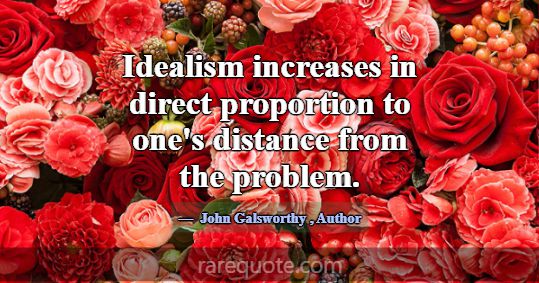
This quote implies that people's idealistic tendencies grow as they become further removed from the practical realities of a problem or situation. It suggests that idealism is more prevalent when individuals are detached from the practical constraints and complexities of implementing solutions. It reflects the correlation between idealism and distance from real-world challenges.
This quote expresses the idea that life is fundamentally shaped by our thoughts, perspectives, and mental processes. It suggests that our experiences and reality are influenced by the way we think and perceive the world.
This quote suggests that the positive outcomes or rewards resulting from acts of generosity or kindness may not always be immediately apparent or directly visible. It implies that the impact of such actions can extend beyond immediate gratification.

This quote acknowledges the evolving nature of truth and the need for effective communication or presentation of truths to resonate with different generations or contexts. It suggests that truth should be adapted or packaged in a way that is relevant and compelling for each era.
This quote suggests that valuable qualities or potential can be overlooked or underestimated when they are not immediately apparent or when obscured by external appearances. It highlights the importance of recognizing hidden worth or untapped potential.

This quote acknowledges the value of life experiences as opportunities for growth and learning. It suggests that each experience, regardless of its nature, provides a chance to explore and gain wisdom, contributing to personal development and understanding.
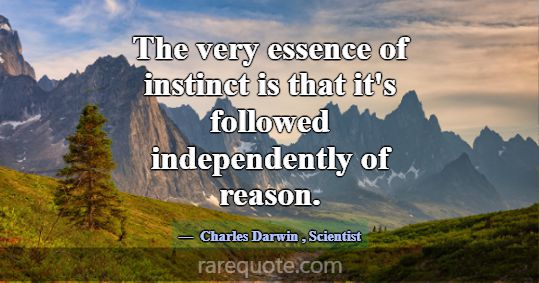
This quote suggests that instinctual behavior occurs without the influence of rational thought or logical reasoning. It implies that instincts guide actions separately from conscious reasoning. It reflects the inherent and automatic nature of instincts as a driving force behind behavior.
This quote emphasizes the enduring nature of memories. It suggests that personal recollections or experiences leave a lasting imprint on an individual's mind and consciousness, surpassing the temporary nature of written or printed records.
This quote suggests that intelligence and intellectual prowess have become highly desirable and attractive qualities. It reflects the recognition that intelligence can be perceived as a form of attractiveness and charisma. It plays on the notion that being "brainy" is now considered cool or fashionable.
This quote asserts that individuals have control and responsibility over the development and shaping of their own character. It implies that personal choices, actions, and values determine the ultimate formation of one's character. It reflects the belief in personal agency and self-determination in character development.
Popular Topic
- Age
- Alone
- Amazing
- Anger
- Anniversary
- Architecture
- Art
- Attitude
- Beauty
- Best
- Birthday
- Brainy
- Business
- Car
- Chance
- Change
- Christmas
- Communication
- Computers
- Cool
- Courage
- Dad
- Dating
- Death
- Design
- Diet
- Dreams
- Easter
- Education
- Environmental
- Equality
- Experience
- Failure
- Faith
- Family
- Famous
- Father's Day
- Fear
- Finance
- Fitness
- Food
- Forgiveness
- Freedom
- Friendship
- Funny
- Future
- Gardening
- God
- Good
- Government
- Graduation
- Great
- Happiness
- Health
- History
- Home
- Hope
- Humor
- Imagination
- Independence
- Inspirational
- Intelligence
- Jealousy
- Knowledge
- Leadership
- Learning
- Legal
- Life
- Love
- Marriage
- Medical
- Memorial Day
- Men
- Mom
- Money
- Morning
- Mother's Day
- Motivational
- Movies
- Moving On
- Music
- Nature
- New Year's
- Parenting
- Patience
- Patriotism
- Peace
- Pet
- Poetry
- Politics
- Positive
- Power
- Relationship
- Religion
- Respect
- Romantic
- Sad
- Saint Patrick's Day
- Science
- Smile
- Society
- Space
- Sports
- Strength
- Success
- Sympathy
- Teacher
- Technology
- Teen
- Thankful
- Thanksgiving
- Time
- Travel
- Trust
- Truth
- Valentine's Day
- Veterans Day
- War
- Wedding
- Wisdom
- Women
- Work

